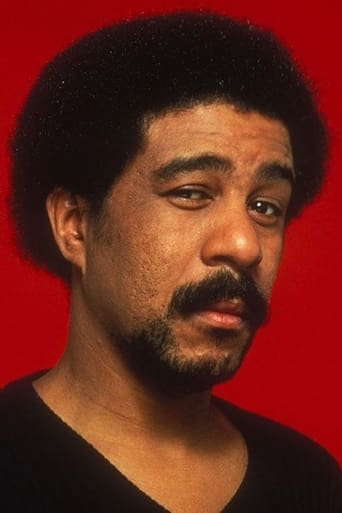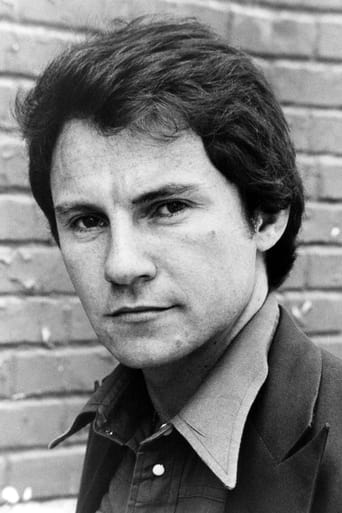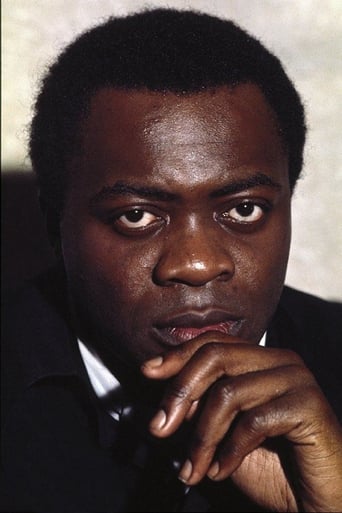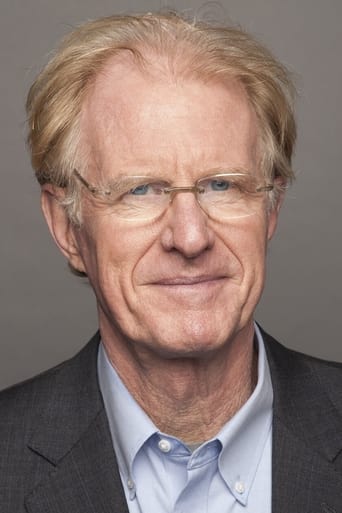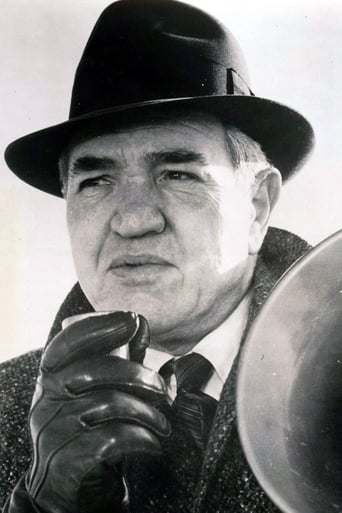Karry
Best movie of this year hands down!
Scanialara
You won't be disappointed!
Marketic
It's no definitive masterpiece but it's damn close.
Erica Derrick
By the time the dramatic fireworks start popping off, each one feels earned.
project717-629-119383
Could one be emboldened to call "Blue Collar" an important and watchable film, but not as great a film as everyone seems to think it is, and that it's obscurity and failure at the box office was not due to the lucid Marxist implications of what was, on paper, a potential masterwork, but that through an author's own misguided execution became something muddy, unfocused, and inert, especially through the neophyte direction of talented actors whose strife-ridden performances lacked the nuance and specific detail to sharpen a didactic political screed into something that was capable of actually emotionally moving the audience rather than just being intellectually admirable?
To me, this is the ironic core of the film's own tragic flaw: it lacks the necessary and basic arc of classical dramatic tragedy, because there is no transition between the beginning's complacent discontent and the ending's ignorant discontent; there should be a transition between the beginning's complacent discontent and the various personal flaws in each individual that leads each of them to convince themselves that an act of crime will be a change-agent against corporate evil when it's nothing but it's own reflection, and it is this specific blind spot in each of them, this essential self-delusion motivated by so much justifiable cynicism and hidden psychological suffering, that is not fully explored in any sort of in-depth way, which doomed the film to an affectively barren and arm's-length experience, and short-circuited the heart of it's powerful social criticism. An interesting footnote is that Schrader recently has stated that he doesn't like the film, and has essentially disowned it. It would be interesting to know why, exactly, he feels this way and if it syncs up with any of these particular misgivings. Just off the cuff, here are some further impressions: Keitel's performance generally lacks vulnerability and paternal tenderness, especially in the scene with his daughter's heartbreaking condition; Pryor's performance, although rife with the brilliant and characteristic stylings of his then-dangerous comic persona, fails to convey the more subtle and encroaching shades of corruption that slowly turns a righteous malcontent into a tragically co-opted puppet, and Kotto, who arguably gives the best performance in the film, is too dialed down and laid-back in terms of representing the larger-than-life Rabelaisian spirit of his character's intelligence and Bacchanalian coping mechanisms, and therefore this somehow lessens the horror of his death (even though the nature of his death scene is horrifying in principle) thereby reducing the symbolism of his character as the most potent spiritual threat against the deathtrap of capitalist exploitation, which renders him the figure out of the three main characters to be most fated to an assembly-line martyrdom. All this being said, the film is a respectable and iconic example of what was possible within the non-corporatized mainstream studio system of the late 1970's, a Hollywood as gone with the wind as any lost civilization in history. For that reason alone, it should be cherished and appreciated, and it's nice to see that it has been re-released in a beautifully restored print on Blu-Ray, with much more compelling artwork than even it's original 1978 theatrical release poster.
Steve Pulaski
Paul Schrader's Blue Collar paints a depressing picture of the American blue collar worker - one Karl Marx would've simply shook his head at and scoff at in disgust. It shows a group of relatable individuals, all of whom slumming their lives away at a dead end, blue collar job, knowing all too well that they're expendable employees, when one particular member of the labor union is so unsatisfied with the lack of productivity on part of his union bosses that he challenges the incumbent to run for union boss. He believes that, if elected, he'd work for the people rather than having the people voice demands that ostensibly appear to fall on deaf ears. It isn't until he inches closer and closer to this potential gig that he realizes just what he's up against, the hoops he'll have to jump through, and the soul of his he'll have to sell in order as a price that comes with that kind of title.The optimistic soul is Zeke Brown (Richard Pryor), who works alongside his two best friends Jerry Bartowski (Harvey Keitel) and Smokey James (Yaphet Kotto). A great deal of Zeke's motivation to run for union boss comes when a tax collector comes to his house to collect unpaid taxes. In a bout of rage and frustration I'm sure many of us have felt, Zeke rants at the blameless tax collector by saying he barely makes enough money to buy food for his home, let alone keep the electricity running. He follows up by asking why he can't get a break when the same tax collectors give countless breaks to those on Wall Street. Zeke's rant is one of the defining scenes of this film, for it tackles a problem that, even over thirty years following this film's release, is a constant, every-day problem and insurmountable battle for a great deal of families.Zeke, Jerry, and Smokey decide to find a way to rob the union headquarters. However, upon executing their plan, they discover the union boss doesn't lie when he says that the union is low on cash, for they find very little money. The trio then stumble upon a ledger that contains information about illegal loans that reveal mob connections. Now the men know what it's like to be plunged into a world of crime and uncertainty, with their lives at risk and their optimism for their careers turned into a bitter, backstabbing game of survival of the fittest in a capitalist nightmare.There's a sadness that lurks in many American crime dramas and that sadness usually stems from the fact that something that should benefit people, or, at the very least, give them something to believe in, doesn't actually operate the way people think it does. Martin Scorsese's Casino showed us the brutal interworkings of a Las Vegas casino that was rigged to make the consumer lose at all cost, and make the soul pay a hefty price had they tried to beat the odds, and a movie like Oldboy shows the real ugliness of people in a crowded, tight-knit area that would lead you to believe people would be brought together or at least unified on a collective term. Blue Collar, however, cuts deeper. These are blue collar jobs we're looking at with this film; not clean-cut white collar jobs and not a rare case of fraud or backhanded dealings in one company. These kinds of manipulating tactics used amongst big business are an unfortunately common practice and Schrader exposes it in a startling manner.Schrader uses his exposure by getting Richard Pryor the leading role in a film that only manages to be funny when Pryor's character shows off his brazen attitude, which is very infrequent. Here, Pryor goes from the easily recognizable funny-man many of us know him as to a frighteningly hungry character, be it hungry for truth, or eventually, hungry for manipulation and winning. He commands the screen, even when assisted by the likes of Kotto and Keitel. This is his film through and through, a film where his formerly basic color palette of an actors transcends any kind of pre-conceived notions or judgment and shine bright and really show audiences his capabilities as a well-rounded character actor.Blue Collar is an ugly film, thematically and in terms of the situations its characters are forced into. It shows personal economic freedom and progress as a neverending cycle that results in nothing but further inequality and disenfranchisement from a country that allegedly fights against it. If a film like this came out in present time it would be a strong social statement, but its 1978 release date shows that little has changed in present time when it comes to the dealings of big business.Starring: Richard Pryor, Harvey Keitel, and Yaphet Kotto. Directed by: Paul Schrader.
tjoyce14150
How many times can one film be reffered to as "underrated" here on IMDb? In the case of this film it can't be said enough. This is the kind of hard hitting, emotionally involving film that made the 70s such an amazing decade in screen history. The acting is superb; without a doubt Richard Pryor's finest effort. Harvel Kietel is his usual magnetic self and Yaphet Kotto is understated yet electric at the same time. Thie dialogue is unlike what you would hear coming out of Hollywood today, and thats too bad. It hits you in the gut and makes you wince; which is as it should be dealing with this material.If you have not yet done so SEE THIS FILM!
tavm
After years of reading about this Paul Schrader drama, I finally watched Blue Collar on Netflix Streaming. It stars Richard Pryor, Harvey Keitel, and Yaphet Kotto as three auto assembly workers who feel let down by their bosses and the union rep they don't trust. While Pryor does have some comic moments, he's allowed to be more serious when the film takes a route that challenges these three friends' loyalty to each other. Keitel and Kotto are also very compelling especially when the story concerns the latter's fate. And the score by Jack Nitzsche and Ry Cooder really pours the blues on. So on that note, I recommend Blue Collar. By the way, having noticed that the movie is produced by Norman Lear's company of T.A.T. Communications, he certainly wasn't above plugging his shows "The Jeffersons" and "Good Times" by putting some long clips in when the characters are watching television!



